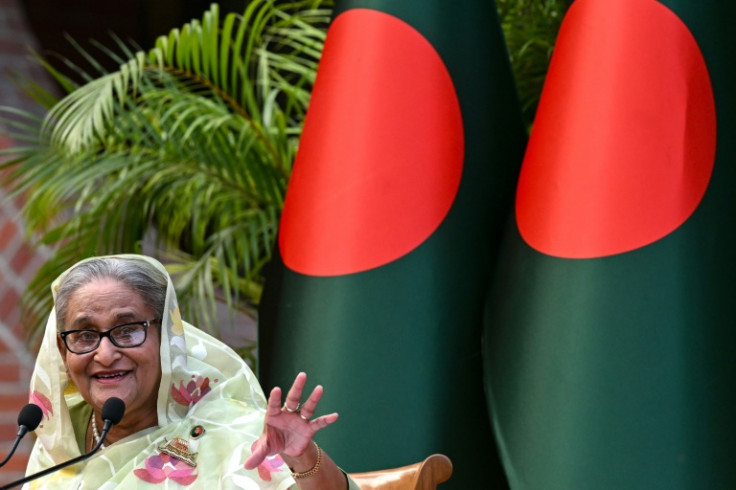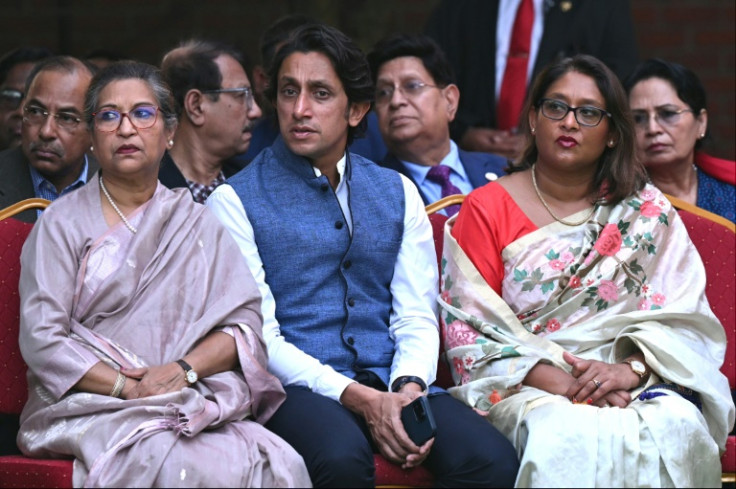After Hasina, Who? The Heirs To Bangladesh's 'Iron Grip' PM

Bangladeshi Prime Minister Sheikh Hasina takes her fifth oath of office on Thursday, solidifying her dominance of national politics and underscoring her lack of a clear successor.
The autocratic premier's power is at its zenith in the world's eighth-most populous nation, with the opposition neutralised by mass arrests and the ruling Awami League bent to her will.
With such commanding control, analysts said Hasina -- who will be 81 if she serves a full term -- will be able to anoint her replacement.
But the question of who will eventually step into her shoes is a highly taboo one in the corridors of power.
AFP asked more than half a dozen leaders of the Awami League about the party's plans for when she leaves office, but all refused to speak on the record due to the sensitivity of the topic.
"She does not like speaking about this succession issue," one mid-ranking party leader, who works in the league's international wing, told AFP.
Hasina is the daughter of Bangladesh's founding leader and an emblem of the country's entrenched tradition of dynastic politics.
Pierre Prakash of the International Crisis Group told AFP that Hasina was unlikely to find a suitable successor from outside her family.
Hasina has helmed the political party co-founded by her father since 1981, and Prakash said her "iron grip on the party's decision-making has held back the rise of capable younger leaders".
Observers believe her eventual replacement will be one of three close family members.
Sajeeb Wazed Joy is Hasina's eldest son and has served as an important aide to her government despite living outside the country.
The 52-year-old spearheaded an expansion of internet services in Bangladesh and until November served as a digital adviser to his mother, acting as an unofficial government spokesman on social media.
He is also closely connected with two prominent think-tanks linked to the Awami League and his face is displayed on campaign posters alongside his mother's.
But according to a senior Awami League lawmaker close to Hasina, Joy does not want to pursue a political career and prefers to stay in the United States with his American family.
Joy briefly visited Bangladesh last November but did not participate in the most recent election campaign.
Back in 2016, he even upbraided party officials for making him a formal party member without his permission, the lawmaker told AFP.
Hasina's father, Sheikh Mujibur Rahman, Bangladesh's founding leader, was assassinated in 1975 during a military coup by disgruntled army officers who also murdered her mother, three brothers and other family members.
The future premier and her younger sister Sheikh Rehana, now 68, were both abroad at the time and have shared a close bond ever since escaping the attack.
Hasina paid tribute to her sister just days before last week's election in a speech recounting how Rehana looked after her two children while she was establishing her political career in the 1980s.
Rehana has regularly accompanied Hasina on the campaign trail and to meetings abroad with foreign leaders, and the pair were seen celebrating together after Sunday's vote.
Her "experience and influence within the power corridors of Dhaka" make her a credible successor, Avinash Paliwal of the School of Oriental and African Studies in London told AFP.
Saima Wazed, 51, is the second of Hasina's two children and was relatively unknown until last year.
In November, she was nominated to be the Southeast Asia regional head of the World Health Organization, despite criticism over her lack of public health experience.
Medical journal The Lancet said Wazed's candidature had "raised questions over transparency and nepotism", charges she rejected.
Wazed has also been a regular member of her mother's retinue in high-profile diplomatic tours but lacks experience in local politics.
Paliwal said Saima nonetheless benefitted from having a clean slate in Bangladeshi politics while her relative youth "could have a powerful appeal among young Bangladeshis".
Prakash of the International Crisis Group said none of the three were ultimately compelling candidates to succeed Hasina, and their elevation could cause the political machine she has spent a lifetime maintaining to fracture.
"Analysts doubt any of them would have the power base or experience to maintain party unity in the way that Hasina has done so effectively," he added.
His scepticism was shared by Bangladeshi voters asked by AFP whether Hasina's possible heirs could match her formidable political legacy.
"Joy does not know the soil and sons of the country," university graduate Ahmed Yousuf, 25, told AFP.
"Rehana is the daughter of our founding leader but she lacks experience and skills. Same goes for Saima. Can they wield power the way Hasina has done?"

© Copyright AFP 2024. All rights reserved.
















